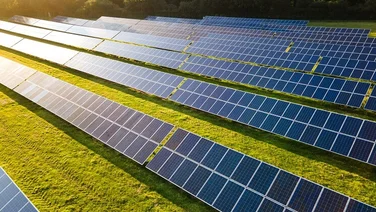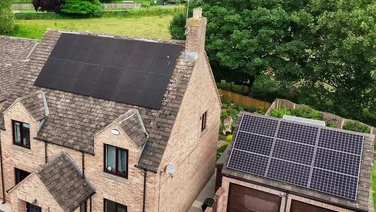- A solar battery is a storage device for excess solar electricity
- A solar-plus-storage system saves the average 3-bed house £582 per year
- You’ll typically cut your carbon footprint by 7% with a solar battery
The average cost of a solar panel for a three-bedroom home is £8,806, according to the latest data by the MCS. This is almost a £2,000 decline compared to 2023.
As costs continue to decline, now is the time to look into getting a solar battery.
A solar battery can store the electricity your panels generate for you to use later on. This will help you be more energy independent, cut your carbon footprint by 7% on average, and save 30% more on your energy bills than you would with solar panels alone.
Here’s everything you need to do if you’re considering adding a solar battery to your system.
To find out how much a new solar-plus-storage system will cost you, simply fill in this free form, and our qualified installers will be in touch.
What is a solar battery?
A solar battery is a device that allows you to store the excess electricity your solar panels generate, so you can use or sell this energy at a later time.
Unless there’s someone at home and using electricity every minute of every day, you’ll have solar power that goes unused – typically, about 50% of what your panels generate.
While you can sell it back to the grid, you could save more on your bills if you store it and use it yourself, with the help of a solar battery.

How does a solar battery work?
A solar battery works as an overflow storage unit.
When sunlight hits solar panels, they turn this natural resource into direct current (DC) electricity, before converting it into alternating current (AC) electricity that powers your home.
And when your home is fully powered, any excess solar energy will be rerouted to charge your battery, in much the same way you charge your phone.

You can either get a lead acid battery or a lithium-ion model, which offers faster charging and a higher capacity.
After the sun goes down and your panels stop producing energy, it’ll be time for your solar battery to shine, by providing you with all the energy it’s gathered.
This will happen automatically, so you won’t need to worry about monitoring the system.
Daylight hours don’t always match when you use electricity at home, and a battery solves this problem.
You’ll need to make sure your system includes a solar charge controller to prevent overcharging and the current from flowing backwards.
How much does a solar battery cost?
An 8kWh solar battery typically costs £4,500 for a three-bedroom house, though the exact amount depends on the model, brand, and the materials it’s made from.
Batteries also require little-to-no maintenance, so your initial outlay will most likely be the last time you have to spend money on them.
You’ll usually pay 10%-to-20% more for a more powerful solar battery that can take you completely off-grid, which typically works out to around £5,000.
For more information on how you can expect to pay, read our guide to solar battery costs.
You might also be eligible for a grant to help alleviate some of the costs associated with a battery, so check out our article: How to get government grants and funding for solar panels.
How much money do you save with a solar battery?
The average three-bedroom household will save £582 per year on electricity with solar panels and a solar battery – around £130 more than with solar panels alone.
However, the initial cost of a solar battery – £4,500 on average – and the fact that it will typically last 10-15 years means it’s usually not worth adding a battery to your solar panel system. This could possibly change in future, for example if energy costs go up a lot.
For more information, read our guide, Are solar batteries worth it in the UK?
Want to get a better idea of what it’s like to own a set of solar panels? Check out our case study with Shirley Ward – a 73-year-old retired office worker, based in North Yorkshire.
Shirley has a 2.4 kW solar array and a Solax battery, and managed to break even on the system in 10 years. Despite electricity prices increasing around the world, Shirley’s panels have brought her energy bills down to £15 a month, instead of £50.
Check out the full interview with Shirley to learn more about solar panels.
What size solar battery do you need?
The average three-bedroom household needs an 8kWh solar battery.
If you live in a house with one or two bedrooms, you’ll likely need a battery with 2-4kWh of capacity.
And if your household has four or five bedrooms, start by looking at 9.5kWh solar batteries.
For more information, check out our guide, What Size Solar Battery Do You Need?
How long does a solar battery last?
Solar batteries usually last for 15 years and come with a 10-year warranty – though their capacity might decline in their later years.
They have to perform repetitive, daily charging and draining cycles, and just like your phone’s battery, this eventually wears them out.
If you buy a top-quality model, the chances are higher that it’ll last beyond its 10-year warranty.
A 5 kWh battery will typically last between 10 and 15 years.
A 10 kWh battery can power your house for 30 hours, on average.
A typical three-bedroom household uses 7.9 kWh per day, meaning you’ll be covered for a day and six hours if the grid fails – or even longer, if you’re careful.
Make sure the engineer who sets up your battery installs it so you can use it during a power cut, and you’ll be set.
Remember, your battery’s exact lifespan will depend on how many cycles it can endure and its cycle duration.
Most will be able to go through 5,000 cycles before they start significantly deteriorating – which puts them squarely in the range of 10-15 years.
What is ‘Depth of Discharge?’
Depth of Discharge (DoD) is a measure of the maximum amount of a battery’s capacity you should use.
For example, if you own a battery with a total capacity of 10kWh and a maximum DoD of 85%, you should only use a maximum of 8.5kWh.
Although you may be able to use more, if you repeatedly do so it’ll wear away the battery much more quickly. The DoD is useful to know because a higher DoD means more of the battery’s capacity is actually usable day to day.
The pros and cons of a solar battery
| Pros | Cons |
|---|---|
| It allows you to save £536 per year | It costs £4,500 on average |
| You’ll reduce your carbon footprint by an extra 15% | You’ll have to set some space aside for it |
| You can be more energy independent, so energy price hikes will affect you less | |
| You may have your own energy supply in a power cut happens |
What type of solar battery should I buy?
Once you’ve decided to buy a solar battery, you need to decide on its chemical composition and electricity current.
It’s wise to speak to multiple professional installers about this before you make a decision, but we’ve explained the basics below.
Lead acid or lithium-ion?
If you have solar panels, lithium-ion batteries are the best.
They’re more compact (about half the size), more efficient, faster at charging, have a higher capacity, and last for 10-15 years – about twice as long.
They’re also more expensive, but they’re a better buy than lead acid batteries.
Lead acid batteries come in two varieties: flooded or sealed.
The typical lifespan of a flooded lead acid battery is a bit longer than a sealed lead acid battery (5-7 years vs 3-5 years), but it also requires more maintenance.
If you’re looking for the cheapest possible solar energy storage system, the flooded lead acid battery may be a good choice.
AC or DC?
While the Aussie rock band went for a bit of both, you have to choose one or the other. If you’re installing a solar battery at the same time as solar panels, it’s best to opt for a DC (direct current) battery, which connects directly to the panels and doesn’t require an additional inverter.
However, if you already have solar panels, you’ll need an AC (alternating current) battery. This is much easier to retrofit to an existing system, as it’s connected via the electricity meter, but it also requires an additional inverter.
You should always seek professional help when choosing and installing a solar battery storage system. Make sure your installer is signed up to the Renewable Energy Consumer Code (RECC) as this ensures that they’re signed up to a high standard of conduct, and covers you should you need to make a complaint or claim.
What’s the best solar battery on the market?
The Powervault 3 is the best solar battery on the market at the moment.
The 4kWh model costs just £3.229, comes with a 10-year warranty, and is the smallest top-tier battery available right now – so it won’t take up much space.
You can also monitor how your battery is doing online. All in all, British company Powervault has knocked it for six with this machine.
If you want to see alternative models and how we ranked them, check out our guide to the best solar batteries.
Retrofitting a solar battery to an existing solar PV system
If you already own solar panels, you can easily retrofit a solar battery. When the solar battery is installed, it must be either AC-coupled or DC-coupled, and this depends on the type of inverter your panels are using.
If your PV system has a microinverter, then the solar battery will have to be AC-coupled, which is a fairly quick installation. However, this solution can lead to additional energy loss over time, as it involves converting the solar-generated electricity twice.
If you don’t have a microinverter, you’ll need to replace your existing inverter with one that will work with your solar battery. This is a higher cost, but it involves converting the solar-generated electricity once.
You can fill in this form to gather quotes on how much a retrofit will cost. Our trusted suppliers will be in touch and they can help work out exactly what size battery you’ll need.
Summary
- Having a solar battery means you can store the excess electricity your solar panels generate, so you can use or sell this energy at a later time
- Solar batteries can last between 15 and 30 years, and come with a 10-year warranty – though their capacity might decline in their later years
- You can easily retrofit a solar battery to an existing solar PV system
- Complete this short form and you can get free quotes from qualified installers.







